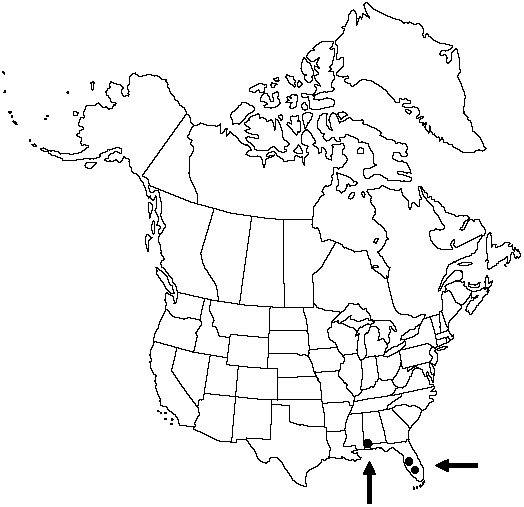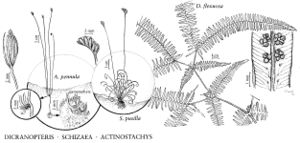Difference between revisions of "Dicranopteris flexuosa"
Bull. Torrey Bot. Club 34: 254. 1907.
FNA>Volume Importer |
imported>Volume Importer |
||
| (7 intermediate revisions by 2 users not shown) | |||
| Line 8: | Line 8: | ||
}} | }} | ||
|common_names=Forked fern;net fern | |common_names=Forked fern;net fern | ||
| − | |basionyms={{Treatment/ID/ | + | |special_status={{Treatment/ID/Special_status |
| + | |code=F | ||
| + | |label=Illustrated | ||
| + | }} | ||
| + | |basionyms={{Treatment/ID/Basionym | ||
|name=Mertensia flexuosa | |name=Mertensia flexuosa | ||
|authority=Schrader | |authority=Schrader | ||
| + | |rank=species | ||
| + | |publication_title=Gött. Gel. Anz. | ||
| + | |publication_place=1824: 863. 1824 | ||
}} | }} | ||
|synonyms={{Treatment/ID/Synonym | |synonyms={{Treatment/ID/Synonym | ||
|name=Gleichenia flexuosa | |name=Gleichenia flexuosa | ||
|authority=(Schrader) Mettenius | |authority=(Schrader) Mettenius | ||
| + | |rank=species | ||
}} | }} | ||
|hierarchy=Gleicheniaceae;Dicranopteris;Dicranopteris flexuosa | |hierarchy=Gleicheniaceae;Dicranopteris;Dicranopteris flexuosa | ||
| Line 23: | Line 31: | ||
}}<!-- | }}<!-- | ||
| − | --><span class="statement" id="st- | + | --><span class="statement" id="st-undefined" data-properties=""><b>Stems </b>2–5 mm diam.; hairs reddish brown to chestnut brown, falling off early. <b>Leaves</b> to more than 1 m, axes straw-colored, glabrous except at petiole base. <b>Penultimate</b> segments sessile, divergent to ascending, in ± equal pairs, deeply pinnatisect, lanceolate to oblanceolate, to 30 × 6 cm wide, leathery, glabrous, whitish waxy or glaucous abaxially. <b>Ultimate</b> segments linear, slightly dilated proximally, margins strongly revolute, apex retuse. <b>Sori</b> nearer midrib than margin; sporangia usually 6–12 per sorus.</span><!-- |
-->{{Treatment/Body | -->{{Treatment/Body | ||
| Line 29: | Line 37: | ||
|elevation=0 m | |elevation=0 m | ||
|distribution=Ala.;Fla.;Mexico;Central America;South America. | |distribution=Ala.;Fla.;Mexico;Central America;South America. | ||
| − | |discussion=<p>Plants in Florida tend to be depauperate when compared to tropical populations; individual leaves are smaller and plants seldom form dense thickets. Dicranopteris flexuosa appears to be a natural element in the flora (J. R. Burkhalter 1985; R. Moyroud and C. E. Nauman 1989). Plants may not persist very long, however, as evidenced by Alabama and some Florida populations that are no longer extant.</p> | + | |discussion=<p>Plants in Florida tend to be depauperate when compared to tropical populations; individual leaves are smaller and plants seldom form dense thickets. <i>Dicranopteris flexuosa</i> appears to be a natural element in the flora (J. R. Burkhalter 1985; R. Moyroud and C. E. Nauman 1989). Plants may not persist very long, however, as evidenced by Alabama and some Florida populations that are no longer extant.</p> |
|tables= | |tables= | ||
|references= | |references= | ||
| Line 38: | Line 46: | ||
-->{{#Taxon: | -->{{#Taxon: | ||
name=Dicranopteris flexuosa | name=Dicranopteris flexuosa | ||
| − | |||
|authority=(Schrader) L. Underwood | |authority=(Schrader) L. Underwood | ||
|rank=species | |rank=species | ||
| Line 51: | Line 58: | ||
|publication title=Bull. Torrey Bot. Club | |publication title=Bull. Torrey Bot. Club | ||
|publication year=1907 | |publication year=1907 | ||
| − | |special status= | + | |special status=Illustrated |
| − | |source xml=https:// | + | |source xml=https://bitbucket.org/aafc-mbb/fna-data-curation/src/2e0870ddd59836b60bcf96646a41e87ea5a5943a/coarse_grained_fna_xml/V2/V2_634.xml |
|genus=Dicranopteris | |genus=Dicranopteris | ||
|species=Dicranopteris flexuosa | |species=Dicranopteris flexuosa | ||
| − | |||
| − | |||
| − | |||
| − | |||
| − | |||
| − | |||
| − | |||
| − | |||
| − | |||
| − | |||
| − | |||
| − | |||
| − | |||
| − | |||
| − | |||
| − | |||
| − | |||
| − | |||
| − | |||
| − | |||
}}<!-- | }}<!-- | ||
-->[[Category:Treatment]][[Category:Dicranopteris]] | -->[[Category:Treatment]][[Category:Dicranopteris]] | ||
Latest revision as of 21:24, 5 November 2020
Stems 2–5 mm diam.; hairs reddish brown to chestnut brown, falling off early. Leaves to more than 1 m, axes straw-colored, glabrous except at petiole base. Penultimate segments sessile, divergent to ascending, in ± equal pairs, deeply pinnatisect, lanceolate to oblanceolate, to 30 × 6 cm wide, leathery, glabrous, whitish waxy or glaucous abaxially. Ultimate segments linear, slightly dilated proximally, margins strongly revolute, apex retuse. Sori nearer midrib than margin; sporangia usually 6–12 per sorus.
Habitat: Terrestrial and climbing on open slopes in drainage ditches, widespread, tropical
Elevation: 0 m
Distribution

Ala., Fla., Mexico, Central America, South America.
Discussion
Plants in Florida tend to be depauperate when compared to tropical populations; individual leaves are smaller and plants seldom form dense thickets. Dicranopteris flexuosa appears to be a natural element in the flora (J. R. Burkhalter 1985; R. Moyroud and C. E. Nauman 1989). Plants may not persist very long, however, as evidenced by Alabama and some Florida populations that are no longer extant.
Selected References
None.
